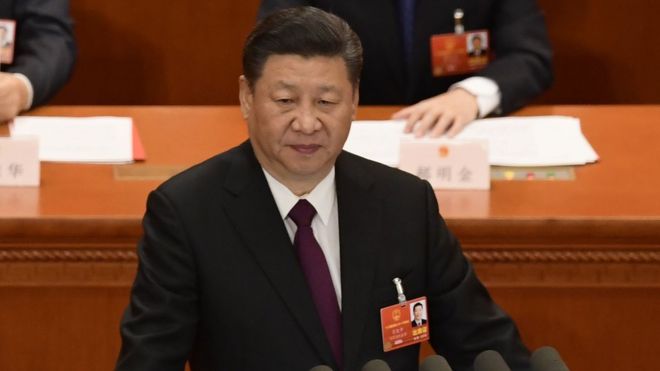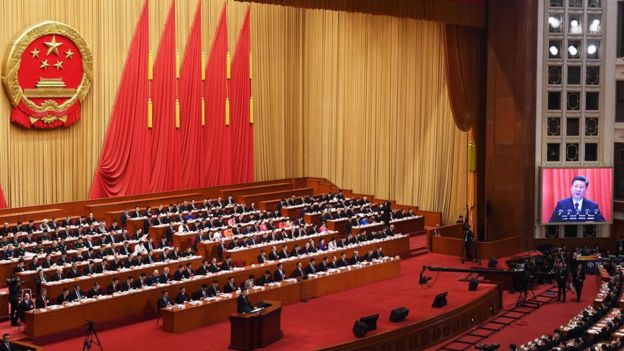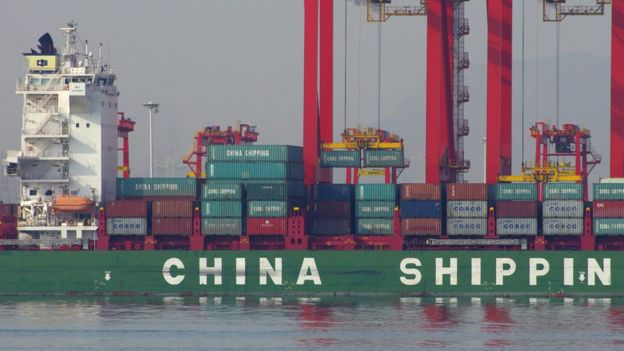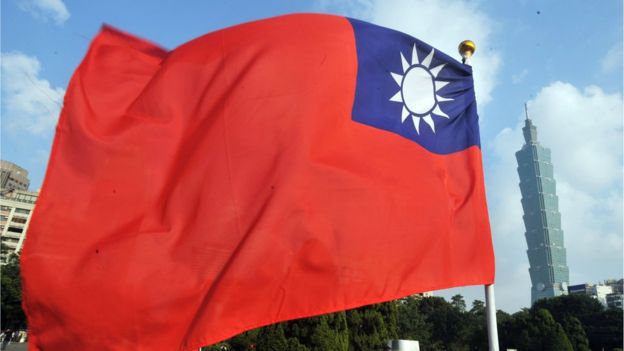 Chinese President Xi Jinping has told the National People's Congress (NPC) that China must not become complacent about its development. Speaking at the closing session of the annual parliament, Mr Xi said China was at a critical stage in its history and only socialism could save it. He also warned against Taiwanese separatism or attempts to split China. Mr Xi is now set up to be China's president for life, after the NPC removed a two-term limit. The motion was overwhelmingly approved by the roughly 3,000 delegates at the start of the session.
Chinese President Xi Jinping has told the National People's Congress (NPC) that China must not become complacent about its development. Speaking at the closing session of the annual parliament, Mr Xi said China was at a critical stage in its history and only socialism could save it. He also warned against Taiwanese separatism or attempts to split China. Mr Xi is now set up to be China's president for life, after the NPC removed a two-term limit. The motion was overwhelmingly approved by the roughly 3,000 delegates at the start of the session.
The parliamentary session meets once a year. It essentially rubberstamps changes already decided by the leadership.
 Image copyrightAFPImage captionThe president urged lawmakers to rule in the interest of the people
Image copyrightAFPImage captionThe president urged lawmakers to rule in the interest of the people
In his speech in the Great Hall of the People, Mr Xi laid out his grand vision for China, reconfirming his ambition to "rejuvenate" the country and continue China's "great contributions to civilisation".
"History has already proven and will continue to prove that only socialism can save China," he said.
He said he saw the people as "the real heroes" of China and that he and all fellow politicians "must work hard for the people's interests".
The president also highlighted major achievements of Chinese history from the invention of paper and gunpowder to building the Great Wall or the writings of Confucius.
Pointing at China's global ambitions, Mr Xi said his country would be strong but not aggressive and would not develop itself at the expense of the rest of the world.
 Image copyrightQRImage captionChina says it wants to plays by fair rules
Image copyrightQRImage captionChina says it wants to plays by fair rules
The president's speech was followed by Premier Li Keqiang's annual news conference.
He stressed that Beijing wanted to co-operate with other countries based on market rules, and that its global trade efforts would be mutually beneficial.
Mr Li said China would further open up its economy and "ensure that both domestic and foreign firms" were "able to compete on fair terms in China's large market".
The premier's comments are a marked contrast to the recent protectionist rhetoric and threats of tariffs from the Trump administration in the US.
Chinese unity
President Xi also said China had to be united to prosper and, in a reference to Taiwan, said Beijing would thwart any separatist attempts.
"The Chinese people share a common belief that it is never allowed and it is absolutely impossible to separate any inch of our great country's territory from China."
Self-ruling Taiwan is considered by Beijing to be a separatist province which will one day be reunited with the mainland. It remains a major potential flashpoint in the region.
 Image copyrightAFPImage captionChina said it will thwart any Taiwanese separatist attempts
Image copyrightAFPImage captionChina said it will thwart any Taiwanese separatist attempts
Mr Xi's comments come just days after a new US law was passed which encourages sending more senior officials to Taiwan to meet their counterparts and vice versa.
Washington does not have formal ties with Taiwan and China is strongly opposed to any moves that would suggest the international community recognises Taiwan as an independent country.
Mr Xi is now considered the most powerful Chinese leader since Mao Zedong, and the NPC saw his position further strengthened.
It confirmed Xi Jinping's second term as president and ratified the inclusion of his political philosophy - "Xi Jinping Thought" - in to the constitution.
Lawmakers also appointed key positions including the central bank head and chief economic advisor and ratified a law to set up a new powerful anti-corruption agency.
The continued push against corruption, a key campaign of Xi Jinping's, is seen by some observers as potentially a tool to sideline his political rivals.
The decision to lift the term limitations has, however, been criticised both abroad and within China.
In the run-up to the NPC, former state newspaper editor Li Datong wrote to lawmakers that scrapping term limits for the president and vice-president would sow the seeds of chaos.
"This is against the tide of civilisation and won't stand the test of time," he told BBC Chinese. "It will be considered a farce in Chinese history in the future."
No comments:
Post a Comment